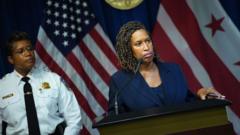Is Washington DC Taking a Stand Against Federal Police Control?

Washington DC's Legal Battle Against Federal Intervention in Police Authority
In a significant legal and political development, Washington DC is challenging the federal government's controversial takeover of its police force. The lawsuit, led by the city's attorney general, Brian Schwalb, argues that the federal government has overstepped its authority and is unlawfully intervening in the operations of the Metropolitan Police Department (MPD). This move comes on the heels of President Donald Trump's assertion that he would utilize federal law enforcement to address what he perceives as increasing crime in the district. The backdrop of this conflict is not only a struggle for local governance but also reflects broader national discussions about law enforcement practices and federalism.
The Context of the Lawsuit
The lawsuit was initiated after US Attorney General Pam Bondi appointed the head of the Drug Enforcement Administration (DEA), Terry Cole, as the "emergency police commissioner" of Washington DC. This unprecedented action has raised alarms about the legal implications of such a takeover. Schwalb contends that the federal government is abusing its limited authority under the law, thereby infringing on the autonomy of local law enforcement.
The attorney general's statement on social media platform X captures the essence of the city's grievance: the federal government has illegally declared a takeover of the MPD, undermining the authority of local officials. The lawsuit seeks judicial intervention to void Bondi's order, stopping Cole from assuming command over the MPD and ensuring that local governance is respected.
Federal Law Enforcement's Role in DC
The backdrop to this lawsuit is President Trump's declaration to crack down on crime in Washington DC. He has mobilized hundreds of National Guard members and federal agents to bolster law enforcement efforts, citing the Home Rule Act of the 1970s. This legislation allows the federal government to utilize local police forces for what it deems necessary and appropriate federal purposes.
However, the local government, spearheaded by Mayor Muriel Bowser, has vehemently opposed this federal intervention. Bowser asserts that there is no emergency warranting such measures and characterizes the federal government's actions as an "authoritarian push." This tension highlights the complex relationship between state and federal authorities, particularly regarding law enforcement and public safety.
Immediate Impacts of the Federal Order
The federal government's actions have led to visible changes in Washington DC's landscape. Armoured vehicles have been deployed near significant monuments and tourist attractions, while law enforcement has increased its presence on popular nightlife corridors. These actions are part of a broader strategy that includes setting up checkpoints and clearing homeless encampments, which some critics view as heavy-handed policing.
Both the mayor and Schwalb have publicly denounced Bondi's order, asserting that it is unlawful. They have instructed Police Chief Pamela Smith not to comply with the directives issued by Cole, emphasizing their commitment to maintaining local control over law enforcement operations.
The Federal Government’s Justification
In defense of its actions, the federal government cites a rise in crime in Washington DC as justification for increased law enforcement presence. Bondi has reported significant law enforcement activity, including 156 arrests and the seizure of 27 firearms within a single week. However, the statistics surrounding violent crime in the district tell a different story.
Crime Trends in Washington DC
Despite the claims of rising crime, data from DC police indicates a decline in violent offenses. After peaking in 2023, violent crime rates have fallen to their lowest levels in three decades, with preliminary data for 2025 suggesting a continuation of this trend. Specifically, violent crime overall has decreased by 26% compared to the same point in 2024, and robbery has seen a 28% reduction.
The Broader Implications of Federal Intervention
This legal battle is emblematic of a broader national discourse on federalism and the relationship between state and federal governments. The implications extend beyond Washington DC, as many cities grapple with questions of police authority, public safety, and civil liberties. The actions taken by the federal government in this case could set a precedent for future interventions and raise questions about the limits of federal authority in local governance.
Conclusion: Where Do We Go From Here?
The ongoing lawsuit reflects deep-seated tensions between local and federal authorities, particularly concerning law enforcement and public safety. As the case unfolds, it will be crucial to monitor how the court addresses issues of authority, governance, and the balance of power. The outcome could have significant ramifications for Washington DC and potentially for other urban areas facing similar challenges.
Frequently Asked Questions
What led to the federal government's intervention in Washington DC's police department?
The federal government's intervention was initiated by President Trump's declaration to crack down on crime in Washington DC, leading to the appointment of DEA Administrator Terry Cole as the emergency police commissioner, which prompted a lawsuit from the city's attorney general.
What are the key arguments in the lawsuit filed by Washington DC?
Washington DC's lawsuit argues that the federal government illegally declared a takeover of the Metropolitan Police Department and is abusing its limited authority under the law, seeking to void the order that appointed Cole as the police commissioner.
How has the local government responded to the federal intervention?
Mayor Muriel Bowser and Attorney General Brian Schwalb have publicly denounced the federal orders as unlawful and have instructed local police chief Pamela Smith not to comply with the directives from the federal government.
What does current crime data indicate about Washington DC?
Current data shows that violent crime in Washington DC has decreased significantly, hitting its lowest levels in 30 years, with a 26% drop in violent offenses compared to the previous year.
As Washington DC navigates this complex legal and political landscape, one must consider the implications of federal intervention on local governance. Will this case change the way we view the balance of power between local and federal authorities in the realm of law enforcement? #WashingtonDC #LawEnforcement #Federalism
Published: 2025-08-15 14:28:05 | Category: wales



